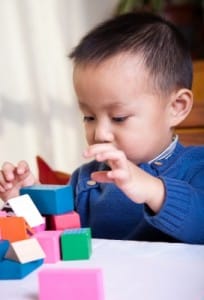
Countless studies have proven the importance of an early autism diagnosis, and as a result, it has been the medical community’s goal to achieve earlier diagnoses for autistic children. Research has indicated that an autism diagnosis can be reliably made as early as age two. The new study indicates, however, that less than half of autistic children in communities are receiving a diagnosis by age five.
“Early diagnosis is one of the major public health goals related to autism,” lead study author Matthew Maenner, Ph.D., told PsychCentral. “The earlier you can identify that a child might be having problems, the sooner they can receive support to help them succeed and reach their potential.”
Previous studies have examined how gender, socioeconomic status and intellectual disability can affect the diagnosis timeline. But experts say it’s the diversity of autism spectrum disorders and the behaviors and deficits associated with it that can make an early diagnosis so difficult. While there are only 12 criteria by which to reach a diagnosis of ASD, there are more than 600 different symptom combinations that would bring a child to the minimum requirements for a diagnosis of autism disorder, just one subtype of ASD. Yet previous studies have failed to look at how autistic behaviors affect the diagnosis timeline. This is what Maenner and his colleagues set out to do in their study of more than 2,700 eight-year-old autistic children.
Published in the Journal of the American Academy of Child and Adolescent Psychiatry, the study found a median diagnosis age of 8.2 years for children with only seven of the 12 criteria. But for children that had all 12 of the listed symptoms, the median diagnosis age dropped to just 3.8 years. What’s more, specific types of symptoms seemed to affect the age at which a diagnosis was made.
“When it comes to the timing of autism identification, the symptoms actually matter quite a bit,” Maenner said.
Findings suggested that children with impairments in nonverbal communication, imaginary play, inflexibility in routines and repetitive motor behaviors were more likely to be diagnosed earlier than those who suffered from deficits in conversational ability, relation to peers and idiosyncratic speech. Maennre says this does make sense since many of the behaviors and deficits associated with a later diagnosis fall into a different developmental stage for children. He added that it may be difficult to improve the diagnosis age of children like these, even if screening processes are improved and more frequent. However, he still feels that more intense screening processes should be developed and introduced into the general community because it could prevent some children from falling through the cracks.
“Increasing the intensity of screening for autism might lead to identifying more children earlier,” he said. “But it could also catch a lot of people at later ages who might not have otherwise been identified as having autism.”
I know, firsthand, how frustrating it can be to have a delayed diagnosis. My son wasn’t diagnosed until 10.5 years. And, had I not continued to push for testing, he might have been one of those children who never received a diagnosis. Now, at his age, there aren’t many services in our area that will cater to his unique needs.
What do you think? Do you feel that screening for autism should be more frequent or intense? At what age was your child diagnosed? How has their age of diagnosis made a difference for your child?
Related Articles:
- Small Plates Have Big Health Rewards for Kids
- Pioneering Surgery Gives Baby Born Deaf The Gift Of Sound
- Cool Haircut Lands Kindergartner in Trouble with School






